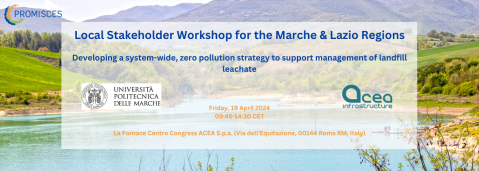
Local Stakeholder Workshop for the Marche & Lazio Regions
Developing a system-wide, zero pollution strategy to support management of landfill leachate
Chemical pollution challenging the circular economy
In Italy, there are multiple locations that must deal with landfill leachate. Currently, conventional leachate treatment plants are not designed to remove emerging organic micropollutants, such as perfluoroalkyl substances (PFAS), which are persistent, mobile and toxic (PMT) for the environment. Generally, landfill leachate treatment plants discharge treated landfill leachate in municipal wastewater treatment plants (WWTPs). Hence, landfill leachate may be a major source of municipal wastewater contamination by PFAS and other PM(T) substances. Untreated landfill leachate and thus PM(T)-rich leachate result in the following issues for the general management of a municipal WWTP:
- Incompliance with new limits for organic micropollutants that may be defined by the upcoming Urban Wastewater Treatment Directive
- Limitation on the reuse of municipal wastewater and municipal sewage sludge due to presence of PMT substances, including PFAS, heavy metals and other PMTs related to the discharge of landfill leachate
To overcome these issues, advanced treatments need to be installed at the landfill leachate treatment plants, such as reverse osmosis or nanofiltration, to remove PMT substances. However, the treatment of landfill leachate produces biological sludge waste which introduces environmental issues during its disposal. The disposal of this biological sludge waste in landfills should already be limited, and could be further limited in the future due to more stringent updated EU sludge regulation. The disposal of this sludge in landfills is expensive and does not solve environmental issues. Indeed, there is a risk of groundwater contamination due to leaching from the landfill. Furthermore, new extracted leachate will always have high concentrations of PMT substances. The disposal of this biological sludge waste through incineration produces toxic substances such as dioxins and furans and is very expensive.
Developing an innovative approach to treat landfill leachate
The PROMISCES partners Università Politecnica Marche (UNIVPM), Acea Spa and SIMAM are investigating a more efficient pre-treatment of landfill leachate using reverse osmosis and nanofiltration to remove PM(T)s such as PFAS. Aside from its use as pre-treatment of landfill leachate, this technology could also be relevant for other highly contaminated water sources, such as industry effluents.
Pyrolysis will also be tested as an innovative solution to treat sludge and concentrate produced during landfill leachate treatment. It should be mentioned that while pyrolysis has several advantages such as allowing for resource recovery, it is not a market-ready technology (low technology readiness level). Hence the implementation of such an additional pre-treatment step for landfill leachate is not straightforward. Aside from the technological aspects, there are also other relevant factors, for example financial, know-how, governance, monitoring requirements, and environmental and human risk (assessment).
An implementation strategy must address barriers and solutions from a systemic perspective. The PROMISCES workshop aims to collaboratively develop such a strategy for landfill leachate pre-treatment with stakeholders.
During the workshop, stakeholders will:
- Identify barriers and other factors that need to be addressed to further management of landfill leachate in the Marche and Lazio regions
- Define solutions to overcome these barriers
- Co-create an interdisciplinary, system-wide strategy that incorporates the defined solutions and needed actors
Why should stakeholders participate?
- Play an active role in the development of a local landfill leachate management strategy
- Receive the latest developments from the research partners at UNIVPM and ACEA
- Discuss current barriers and enablers in the field of leachate management
- Network with other local stakeholders
A summary of the workshop outputs can be downloaded here:
About PROMISCES
PROMISCES (Preventing Recalcitrant Organic Mobile Industrial chemicalS for Circular Economy in the Soil-sediment-water system) will provide innovative technologies to monitor, prevent and mitigate chemical pollution in the environment (water, soil, and sediment). The project will particularly focus on PFAS, which are persistent, highly mobile, and potentially toxic and have been found to accumulate in the human body and the environment. PROMISCES’ results will be integrated in a decision support framework, as well as assessment and regulatory tools for improving human health protection related to resource recovery and use.
